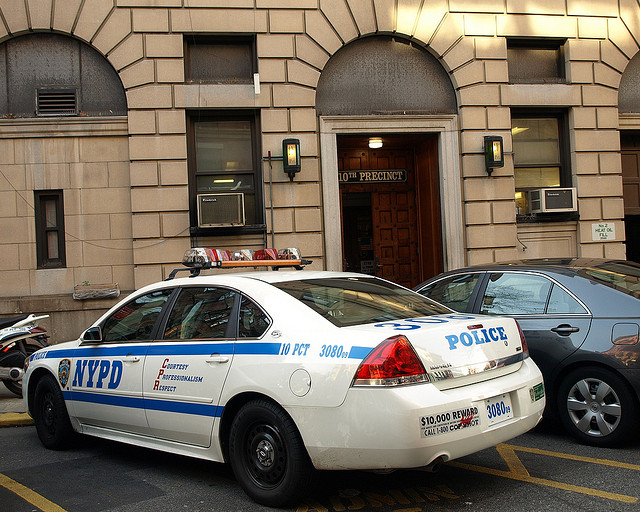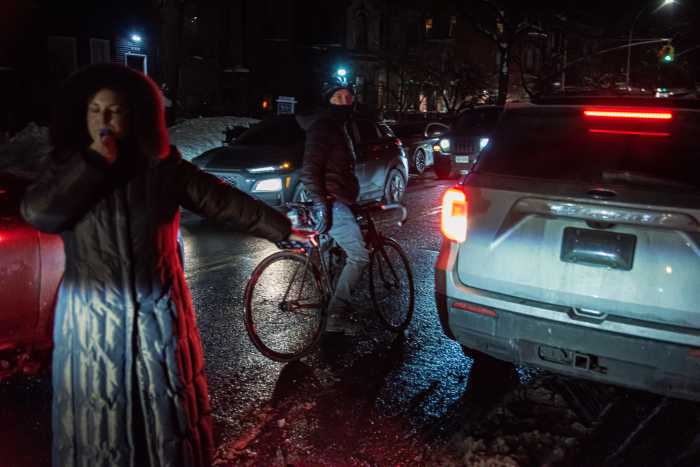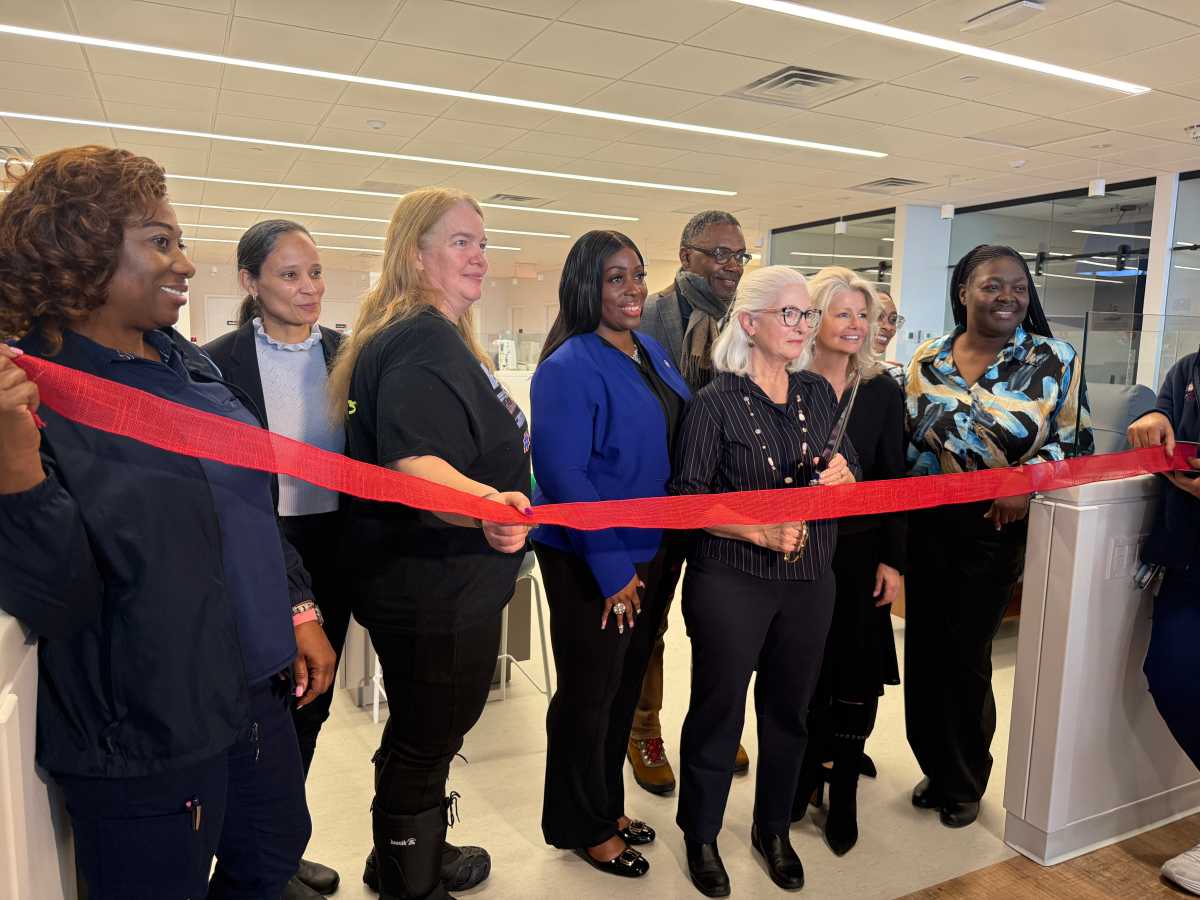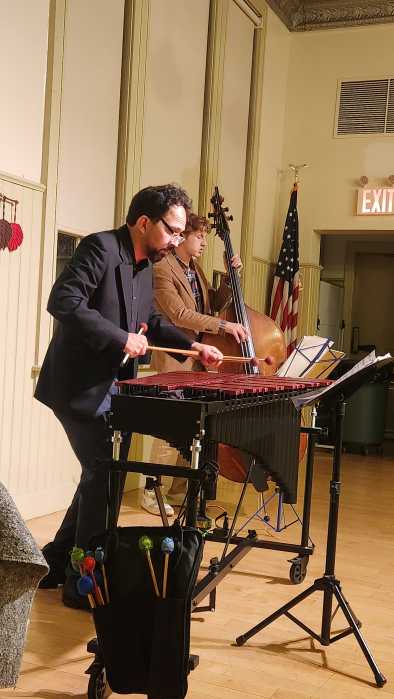BY SCOTT STIFFLER | On the last Wednesday of February, nearly two dozen locals packed the first floor meeting room of Chelsea’s 10th Precinct — for the latest installment of their monthly Community Council Meeting.
Before opening the floor to questions, Deputy Inspector Elisa Cokkinos began by citing the latest crime index statistics — noting that, “As a command, we’re up 12 percent in arrests” compared to the first two months of 2012. A significant amount of that uptick, she said, did not pose a danger to the general public. “It’s felony assault,” Cokkinos said in reference to a spat of domestic violence incidents “whose nature ranges from severe injury to getting hit with a belt.” Sixteen such incidents have occurred so far this year, up from only four by this point in 2012 (the precinct tracks their statistics in the form of 28-day periods).
Officers are close to making arrests in 12 of the 16 felony assault cases. Of the 16 robberies so far this year, Cokkinos noted, “We’re close to making 7 arrests.” That distinction references the moment a person is taken into custody and charged with a crime, following the filing of a complaint.
Recalling a lengthy conversation between precinct representatives and the public during the last Community Council meeting, Cokkinos reported that in the last 28-day period, officers wrote 63 bus stop summonses. Several members of the public had attended January’s meeting to request that more be done to discourage cars, delivery trucks and pedestrians from blocking bus pick-up zones as well as nearby curbs (which hinder wheelchair access to MTA service).
Audible expressions of relief greeted Cokkinos’ announcement that Club Shadow (on 229 West 28th St., btw. 7th & 8th Aves.) was shuttered by the Civil Enforcement Unit on the evening of Thurs., Feb. 21. The NYPD’s decisive, and perhaps final, visit to the popular nightlife establishment happened after years of complaints from nearby residents (many of them regular Council attendees) who have voiced displeasure about late night/early morning quality of life infractions — including double parking, excessive noise and inebriated club patrons. “They’ll be closed for a while,” said Cokkinos, noting that the owners plan to come before Community Board 5 to “plead their case.”
Officer Mike Petrillo, who can often be reached by calling the precinct’s Community Affairs and Crime Prevention Office (212-741-8226), told Chelsea Now that the future of the club is now in the hands of a judge (who may or may not be swayed by any promises made at the CB5 level). “After we serve them with papers,” said Petrillo in reference to the Feb. 21 action, “the Civil Enforcement attorneys and Shadow’s attorneys have to go to court. The judge makes a determination of what goes on from there.”
During the public Q&A session, an exasperated resident of 19th St. (btw. 8th & 9th Aves.) reminded officers that her street “is not a truck route.” Traffic of this nature, and its accompanying noise, is a constant problem, she noted — despite a sign clearly posted on Eighth Ave. sporting a silhouette of a truck with a red line drawn through it (reading “Except Deliveries This Block”). “Golden Touch buses are coming three times a day, at 11am, 3pm and 7pm,” she said. “I live on the same block,” added another woman who acknowledged that, “There is a sign, but it’s small, and there’s no enforcement.” Cokkinos promised to “send my summons guys out there. We’ll take another look at it.”

Assistant District Attorney Daniel Brody gives a presentation on cybercrime and identity theft, at the 10th Precinct’s Feb. 27 Community Council Meeting.
Over the next 15 minutes, Assistant District Attorney Daniel Brody (of Trial Bureau 60) spoke about identity theft — a crime that’s particularly robust in Chelsea, given its high density of bars, restaurants and clubs.
Brody, who handles the prosecution of cybercrime/ID theft cases (often under the supervision of Cybercrime and Identity Theft Bureau chiefs), echoed precautions heard many times at Community Council meetings — when he advised diners not to hang purses on the backs of chairs, and implored common sense practices in clubs (don’t leave belongings unattended while on the dance floor). Within minutes, a wallet or purse provides thieves with a well-rounded profile, and a deep well from which to make unauthorized credit card charges and bank withdrawals. Such opportunistic crimes, Brody said, can impact your credit rating and take years to fully resolve.
In addition to crimes in clubland, Brody warned against two types of skimming devices — the first of which thieves attach to ATMs, often along with a small nearby camera. The device reads your bank card’s magnetic strip, and the camera records you while entering the PIN number. “Jiggle the ATM,” Brody advised. “It might fall off.” You should also make a habit of placing one hand over the keypad as you enter your access code. A second skimming device, referred to as a “black box,” is a palm-sized reader of credit card data — and is often employed by parking garage attendants or restaurant workers who misdirect victims long enough for their credit cards to be run through this easily concealed device. “A cash diet is always the safest thing,” Brody said, qualifying that statement with an admission that, “I use my credit and debit cards all the time.”
Brody emphasized the importance of frequently viewing your online bank and credit card statements, shredding financial documents and making passwords as sophisticated as possible. He also advised those who become victims of identity theft to file a complaint at the local precinct, soon after discovering the crime — and not just because it’s an exercise in good citizenry (such reports help police compile statistics, recognize trends and assign resources accordingly). Fraudulent bank and credit card activity reported to the police, Brody noted, gives the victim documentation that will help absolve them of any financial liability.
For more information, visit manhattanda.org or call the Cybercrime and Identity Theft Bureau Hotline (212-335-9600). A brochure passed out by Brody (“Protecting Yourself From Identity Theft”) can be accessed by visiting manhattanda.org/sites/default/files/Protecting%20Yourself%20from%20Identity%20Theft.pdf.
The morning after ADA Brody’s presentation, Chelsea Now returned to the 10th Precinct and found the following items among three days’ worth of complaints:
Grand Larceny: Declined card clued her to crime
In the early evening of Wed., Feb. 20, when attempting to make several purchases at Best Buy (on Sixth Ave. & 23rd St.), a local woman’s Amalgamated Bank debit card was declined. Later that night, she accessed her online bank account from home — and discovered that five checking account withdrawals (for a total of $2,455) had been made in Woodside, Queens. When filing a complaint at the 10th Precinct on Feb. 23, the victim noted that she had been in possession of her debit card while the unauthorized withdrawals took place.
Grand Larceny: Where’s wallet?
While exiting a cab on the northeast corner of 23rd St. & 9th Ave. in the late morning of Sat., Feb. 23, a West Chelsea resident noticed that her wallet was missing from her pocketbook — later telling police she last recalled using her wallet while paying for another cab earlier, at W. 9th St. & 6th Ave. Shortly after becoming aware of the missing wallet (a purple Smythson valued at $150, whose contents included an Apple gift card worth $140), she was informed that her Chase Visa card had been used to buy gas in Long Island City.
Petty Larceny: Early outreach a real wake-up call
At 9am on Sun., Feb. 17, a woman received a call from HSBC Bank, informing her of two unauthorized transactions on her checking account debit card. An unknown perpetrator withdrew $800 and $200 from the 333 Park Ave. location of Citibank. Several days later, when filling out a complaint at the 10th Precinct, the victim told police that she had been, and still was, in possession of her debit card.






































